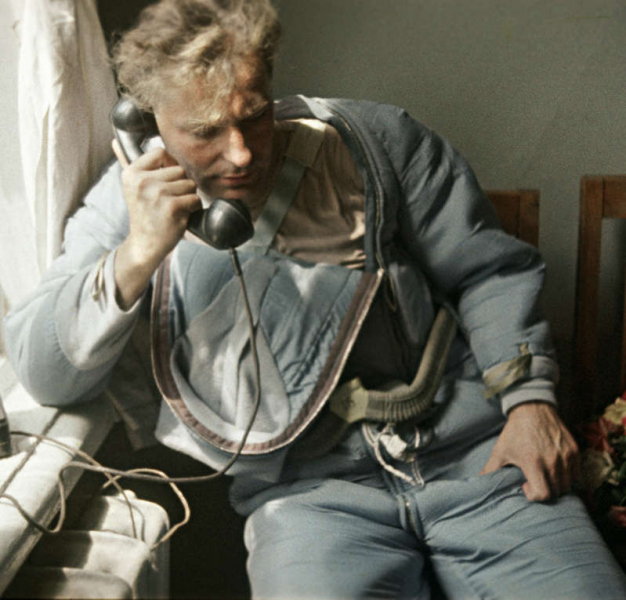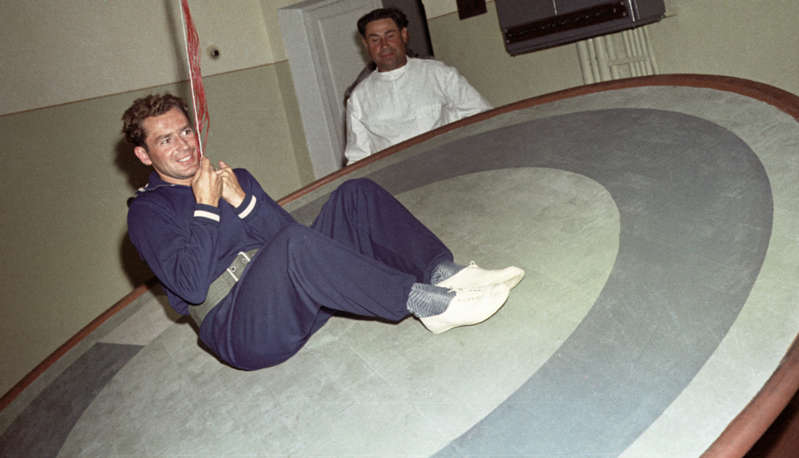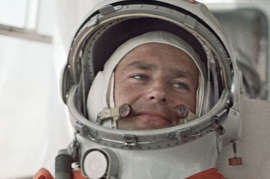German Titov on his way to the Baikonur cosmodrome, 1961
On April 12, the world celebrated the 60th anniversary of the first manned flight into space. Now it was the turn of the second. On August 6, 1961, the Vostok-2 ship started from Baikonur with German Titov on board. Being the second astronaut in a row, Titov was in many ways the first: the first who stayed in space for more than a day, the first to use manual control of the spacecraft, tried eating and sleeping in zero gravity, and also took photographs of the Earth from orbit.
After his flight, rumors circulated for a long time that in fact the astronaut died in space from radiation, and the one who triumphantly travels around the country is his double. Of course, this was not the case. Nevertheless, in the official report written after his return, German Titov did not indicate everything that happened to him.
On Earth, they could think anything
A native of the Altai Territory, German Titov with the call sign “Eagle” spent 1 day, 1 hour and 18 minutes in flight, having made 17 revolutions around the Earth. When preparations were underway for the mission, the doctors proposed to do with three loops (recall, Gagarin made only one), but Titov himself insisted that it was necessary to fly for a day, and Sergei Korolev supported him.
The start went well. An hour later, for the first time in history, the astronaut tried manual control of the ship. At the second orbit, as stated in his further report, he “reported to the Central Committee of the CPSU, the Soviet Government, Comrade Nikita Sergeevich Khrushchev on the progress of the flight and soon received a reply telegram from Comrade NS Khrushchev.”
On the third round, Titov had lunch. His cosmic menu consisted of puree soup, meat and liver pate, bread and blackcurrant juice. Flying over the territory of the USSR, he kept VHF communications and “broadcast greetings to his comrades, Muscovites, the peoples of the Soviet Union, Europe, Asia, Africa, North and South America, Australia”.
True, there was one incident with the connection. When “Vostok-2” left for the so-called “dead loops”, the cosmonaut was allowed to sleep. The next session was scheduled for 2 am, and Herman turned off the receiver, relying on the fact that he would wake up on time – he did not have an alarm clock. But he woke up 15 minutes earlier, decided to take a nap and ended up sleeping 35 minutes. “What a shame! After all, on Earth they may think about some trouble, they may become seriously worried … It took two minutes to finally get rid of sleep, and I got down to work, ”he later recalled. Indeed, Sergei Korolev could not stand uncertainty, and in such a situation, anything on Earth could think.

German Titov reports to the management on the successful completion of the flight on the Vostok-2 spacecraft, 1961
Based on the results of the completed program, German Titov wrote an official report. But when he spoke to his comrades in the first squad of cosmonauts (and they got it so bad that everyone told in detail all the details of his flight, because someone else would fly next, and he should know the nuances), he said something that was not included in that report.
“And if you say in Russian?” – “Sucks!”
6 hours after the start, Titov reported: “I can stand the feeling of weightlessness perfectly.” Herman was lying: in fact, he was sick. This happened after eating food, which he already ate without appetite.
On the sixth orbit, the cosmonaut “went to the toilet” because of little need, did some physical exercises, and on the seventh, he felt really bad. The MCC guessed about this by his monosyllabic answers – he answered only “yes” or “no” to questions from the Earth. “How are you feeling?” – asked his comrade in the detachment Pavel Popovich, getting in touch. “No matter”. “And if you say in Russian?” “Sucks!”
The flight could be interrupted, but Herman flatly refused to land early. Then he was asked to close his eyes and not move until his health returns to normal. Yes, he himself already realized that a minimum of head movements is the only possible way in his situation to cope with nausea. So another round passed. After that, “Eagle” said: “Everything is fine, guys.”
The last stage of the flight was also tense. The automatic landing system turned on in time, the braking took place normally, and at an altitude of 7 kilometers Titov ejected to land by parachute. Everything went according to plan, but, approaching the ground, he saw that he was being carried straight to the railway, where at that moment the train was going. To visit space and die under the wheels of a train – it is difficult to imagine a more tragic fate! Fortunately, Herman coped with the situation and landed not far from the railway embankment, on a plowed collective farm field.
Titov did not report either about this incident or about the nausea experienced in orbit in the official report.
What did this flight give?
But to his immediate leadership and comrades in the detachment, as already mentioned, he retold everything in detail. Herman was listened to attentively and … the cosmonaut training program was softened. The fact is that in the first years of space exploration, training was truly grueling, people preparing for a flight into the unknown were subjected to extreme tests on the brink of survival. Cosmonaut No. 2 was able to convince the command to reduce these loads.

Preparation of German Titov for a flight into space, 1961
The unpleasant consequences of a long stay in zero gravity also became clear, and how you can cope with them (at least at the initial stage). At that time, any information about the well-being of a person in space was invaluable – thanks to the detailed story of German Titov, doctors and engineers from Korolev's team learned a lot of new things.
And most importantly, what they learned is that you can stay in space for hours and still do something. For example, conduct experiments, work successfully. This was the main result of the space mission of German Titov.

